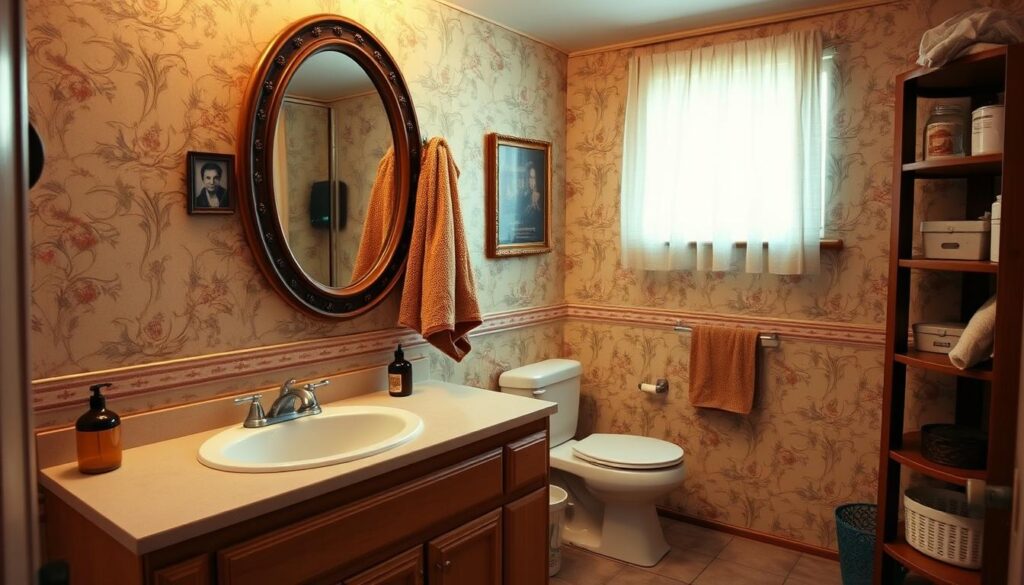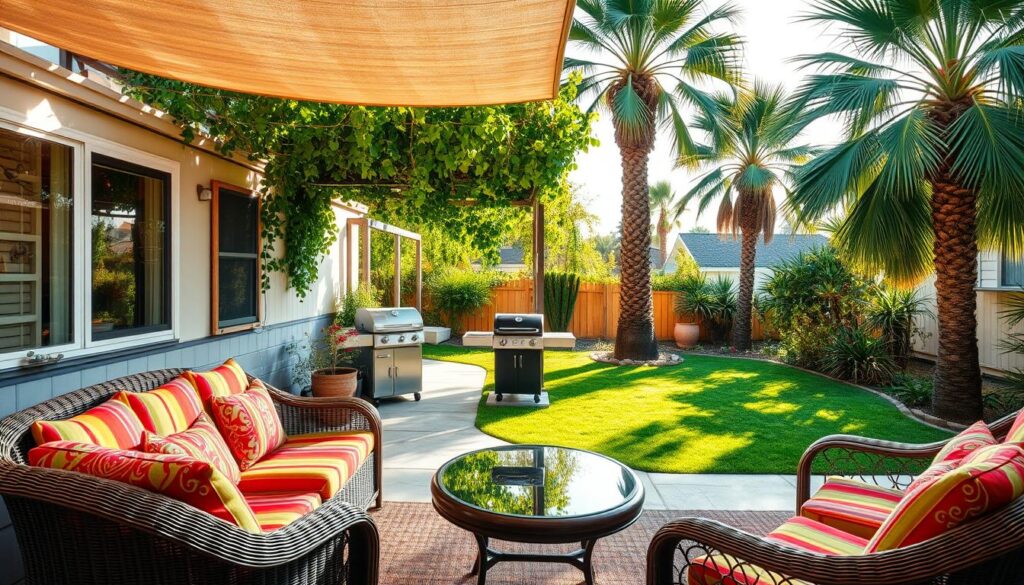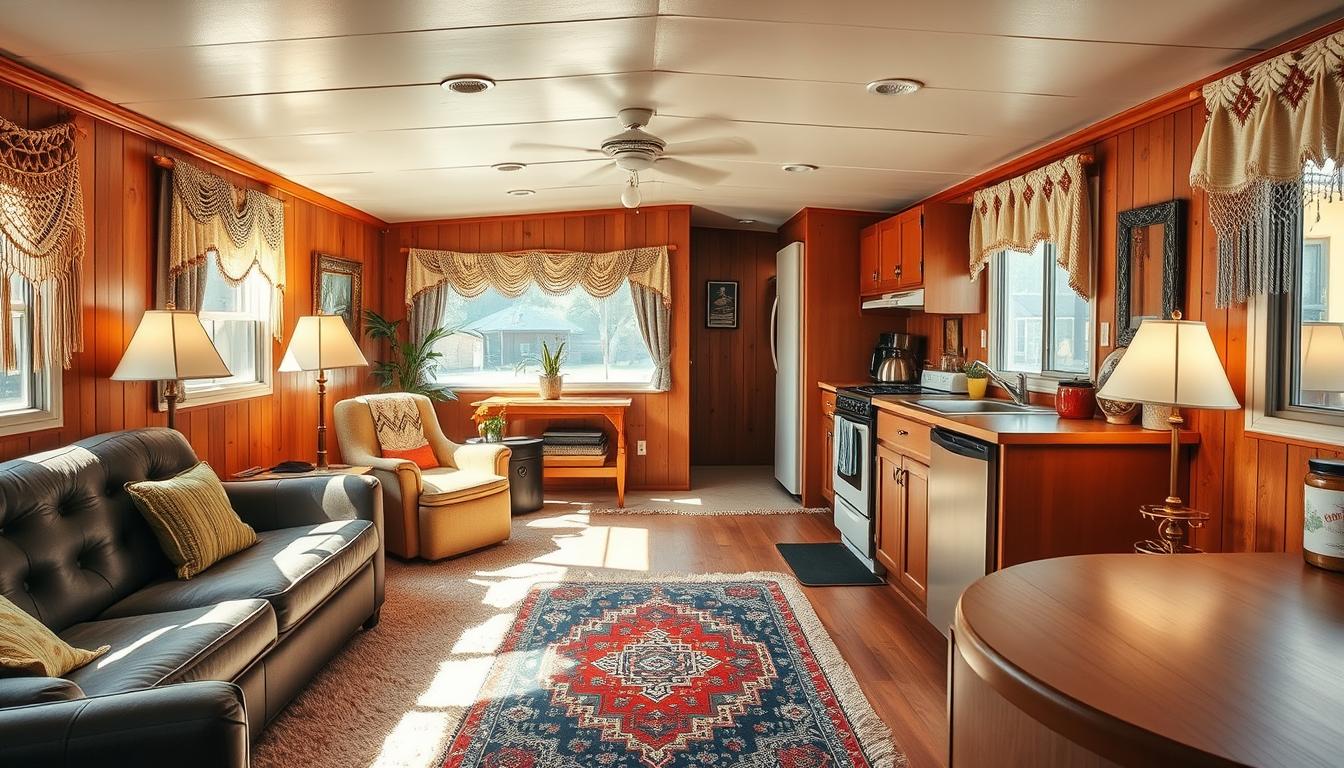Thousands of 1970s mobile homes are still used today. They mix vintage charm with outdated design. We turned our old home into a modern, cozy space. We’re excited to share our journey with you.
Renovating a 1970s mobile home interior needs careful thought. It’s about keeping the original charm while adding modern touches. We started by understanding our home’s design, assessing the space, and choosing materials and decor wisely. For inspiration, check out stylish interior design ideas for mobile homes that mix old and new.
Key Takeaways
- Assess your space to understand its potential and limitations.
- Balance vintage elements with modern decor for a unique look.
- Choose materials and finishes that are both stylish and durable.
- Consider the flow and functionality of your mobile home.
- Don’t be afraid to add personal touches to make your space truly yours.
Embracing the Charm of Retro Design
The 1970s were a time of great expression in interior design. Embracing this retro era can bring a unique flair to our mobile homes. The decade’s bold and vibrant aesthetic still influences design today.
The Allure of 1970s Aesthetics
The 1970s were known for their funky and eclectic style. This style featured bold patterns, bright colors, and unique textures. It was about expressing one’s personality and attitude towards life.
Key elements of 1970s design include natural materials, earthy tones, and a focus on comfort and functionality. These elements create a warm and inviting atmosphere that’s quintessentially retro.
Key Features of Retro Style
Retro style is marked by bold color schemes, geometric patterns, and iconic furniture pieces. To achieve an authentic retro look, it’s essential to incorporate these elements into our design.
- Bold and bright color schemes that often featured avocado green, harvest gold, and burnt orange.
- Geometric patterns such as chevrons and hexagons that added visual interest to walls, floors, and furniture.
- Iconic furniture pieces like bean bag chairs, shag rugs, and lava lamps that became symbols of the era.
Selecting the Right Color Palette
Choosing the right color palette is crucial in capturing the essence of retro design. The 1970s were known for their bold and vibrant colors. It’s also important to balance these hues to avoid overwhelming the space.
| Color | Description | Usage |
|---|---|---|
| Avocado Green | A muted green tone with a yellow undertone. | Accent walls, furniture. |
| Harvest Gold | A warm, golden yellow. | Accent pieces, decor. |
| Burnt Orange | A deep, earthy orange. | Accent walls, furniture. |
By thoughtfully selecting a color palette that reflects the retro era, we can create a cohesive and inviting atmosphere in our mobile homes. Balancing bold colors with neutral tones can help achieve a harmonious and functional living space.
Assessing Our Space and Needs
Renovating a 1970s trailer home means finding a balance between looks and function. We must think about how we use each part of our home. This helps us make it both beautiful and practical.
Functionality vs. Style
Mixing old style with new function is a challenge in our 70s mobile home. To solve this, we should:
- Find ways to improve function without losing the retro look.
- Think about how our daily lives will change with the renovation.
- Choose upgrades that make the space both stylish and useful.
For example, updating the kitchen with modern appliances that look vintage can boost function. It keeps the 1970s charm too.
Prioritizing Essential Areas
Mobile homes are small, so focusing on key areas like the kitchen and bathroom is key. We should:
- Upgrade important fixtures and appliances.
- Improve storage to use space better.
- Make these areas flow better and be more comfortable.
This way, we can make our home more efficient and cozy.
Creating an Open Layout
Creating an open layout can make a mobile home feel bigger. We can do this by:
- Removing walls that aren’t needed.
- Using light colors to make the space feel connected.
- Choosing furniture that fits well in the space.
| Layout Configuration | Space Perception | Functionality |
|---|---|---|
| Closed Layout | Confined | Limited |
| Open Layout | Spacious | Enhanced |
By understanding our space and needs, we can make smart choices. These choices will help us succeed in renovating our 1970s trailer home.
Sourcing the Right Materials
Starting our mobile home makeover means finding the right materials. We aim for a mix of retro charm and modern comfort. This step is key to updating a 1970s mobile home, keeping its original charm while adding today’s comforts and eco-friendliness.
Finding Vintage-Inspired Decor
To keep our 1970s mobile home feeling authentic, we look for vintage decor. This includes retro fabrics, vintage lights, and classic furniture from the 1970s. Thrift stores, antique shops, and online sites are great for finding unique pieces that make our home special.
Choosing decor that’s both nostalgic and functional is important. For example, we can pick vintage-style appliances that look great and work well today.
Choosing Sustainable Options
Sustainability is a big part of our makeover. Using eco-friendly materials helps our planet and makes our home healthier. We focus on recycled, recyclable, or sustainably sourced materials.
- Reclaimed wood for flooring or furniture
- Low-VOC (Volatile Organic Compound) paints
- Energy-efficient appliances
By choosing sustainable options, we make our mobile home stylish and eco-friendly.
Budget-Friendly Materials
Renovating on a budget means getting creative. We look for affordable materials and decor. This might mean repurposing items, shopping sales, or finding cheaper alternatives that look expensive.
Laminate countertops can look like granite but cost less. Engineered wood flooring mimics hardwood without the high price.
Updating the Living Room
A well-designed living room can make our mobile home feel welcoming. It’s a place for relaxation and fun. We aim for a mix of retro charm and modern comfort.
Revamping the Furniture Arrangement
Furniture arrangement is key to the living room’s feel. We aim for a cozy, inviting space. Placing furniture for social interaction makes it welcoming.
For example, a circular sofa and armchair setup fosters community. Also, leaving enough space between furniture ensures comfort and easy movement.
| Furniture Arrangement Tips | Benefits |
|---|---|
| Circular seating | Encourages social interaction |
| Adequate spacing | Enhances comfort and flow |
| Multifunctional furniture | Optimizes space in smaller rooms |
Incorporating Statement Pieces
Statement pieces add character to our living room. For a retro look, vintage or vintage-inspired items work well. Think antique furniture, retro rugs, or classic decor.
A vintage armchair can be both functional and a room focal point. Pair it with a modern coffee table for a striking contrast.
Adding Textures and Patterns
Textures and patterns add depth and interest. Mixing textures like leather and wood creates a rich look. Patterns through rugs, pillows, and wallpaper enhance the retro vibe.
To not overwhelm the space, balance bold patterns with neutrals. A bold rug can be paired with a neutral sofa and walls.
Renovating the Kitchen Area
Our journey to transform a 1970s mobile home focuses on the kitchen. It’s a space that needs both modern features and vintage charm. The kitchen is where memories are made, not just where we cook.
To mix old and new, we must think carefully. Modern appliances with a vintage touch can make the kitchen look great. For example, retro-style refrigerators and stoves add a nostalgic feel while being modern.
Modern Appliances with a Vintage Touch
Adding modern appliances with a vintage look can improve the kitchen’s design. Some good choices include:
- Retro-style refrigerators in various colors
- Vintage-inspired stoves with modern cooking features
- Microwaves and dishwashers with a retro aesthetic
These appliances make the kitchen look unique and stay functional and efficient.
Cabinet Refacing Ideas
Cabinet refacing is a budget-friendly way to update the kitchen. We can do this by:
- Updating the cabinet doors with new hardware
- Refinishing or repainting the existing cabinets
- Adding decorative trim or molding
Refacing our cabinets keeps the vintage charm while adding modern touches.
Maximizing Storage Solutions
Maximizing storage is key in a mobile home kitchen, where space is tight. Some good ideas include:
- Installing pull-out shelves and drawers
- Utilizing vertical space with wall-mounted cabinets
- Incorporating multi-functional furniture pieces
These storage solutions help keep the kitchen organized and clutter-free. This makes cooking and socializing more enjoyable.
In conclusion, renovating the kitchen in our retro mobile home needs careful planning. By using modern appliances with a vintage look, refacing cabinets, and improving storage, we can make a stylish and functional kitchen.
Transforming the Bathroom
Turning the bathroom into a retro oasis is key in our mobile home makeover. We’re excited to share how we give this space a fresh, nostalgic vibe.

The Impact of Simple Upgrades
Simple changes can greatly improve our bathroom’s look. Replacing old fixtures and updating decor brings a retro charm. For example, vintage faucets can make a big difference.
Also, new lighting and retro accessories enhance the feel. These small steps help create a unified retro design that fits our 70s mobile home interior ideas.
Retro Fixtures for Authenticity
To make our bathroom truly retro, we use vintage or vintage-inspired fixtures. Think clawfoot tubs, pedestal sinks, or retro toilets. These items are both functional and stylish, capturing the 1970s spirit.
Choosing retro fixtures means finding a balance. We want them to look good and work well today.
Creative Storage Solutions
A good bathroom needs good storage to stay organized. We use creative solutions like vintage cabinets, baskets, or shelves. These fit our retro theme.
With these storage ideas, our bathroom stays tidy and beautiful. This careful planning is key to our mobile home interior makeover. It ensures every detail adds to the look.
Designing Cozy Bedrooms
In our 1970s mobile home renovation, cozy bedrooms are key. A cozy bedroom makes our home more comfortable and appealing.
Comfortable Bedding Options
Choosing the right bedding is important. We pick soft, breathable fabrics like cotton or linen. Adding different textures makes our bed more interesting.
For a 1970s vibe, we use vintage patterns or retro bedding. Or, we go for a simple look with neutral colors for a calm feel.
Utilizing Space Efficiently
Space is precious in a mobile home. We use furniture that does more than one thing, like storage beds or wall shelves. This keeps our room tidy.
A clean room feels bigger and helps us relax. We keep our bedroom organized, making it a peaceful place to rest.
Personalizing with Art and Decor
Adding personal touches makes a bedroom unique. We decorate with art, items, and photos that show our style and interests.
We pick decor that matches our bedding and furniture. For example, vintage posters or retro accessories add to the 1970s feel.
| Material | Breathability | Softness |
|---|---|---|
| Cotton | High | High |
| Linen | High | Medium |
| Polyester | Low | Variable |
Thinking about breathability and softness helps us choose the best bedding. This makes our bedroom cozy and comfy.
Outdoor Living Spaces
Creating an inviting outdoor living space can make our mobile home more appealing. We’re excited to explore how outdoor areas can extend our indoor living. This transformation will enhance our home’s overall appeal.
Our outdoor space is more than just an addition to our home. It’s a place to relax, entertain, and enjoy nature. By designing it thoughtfully, we can make a smooth transition between indoors and outdoors. This effectively expands our living space.
Convenient Patio Area
A well-designed patio is the heart of any outdoor living space. We need to think about both functionality and looks. The layout should be easy to move around in and meet our needs, like dining or lounging.
When planning our patio, we should also think about the flow between areas. For example, placing a patio near the kitchen makes serving meals outdoors easier. Adding comfortable seating and good lighting can also improve the ambiance.

Right Flooring Choices
Choosing the right flooring for our patio is key. It should be durable, weather-resistant, and look good. There are many options, each with its own benefits.
| Flooring Type | Durability | Maintenance | Aesthetic Appeal |
|---|---|---|---|
| Concrete Pavers | High | Low | High |
| Natural Stone | High | Moderate | High |
| Porcelain Tile | High | Low | High |
Incorporating Greenery and Flowers
Adding greenery and flowers can bring color and nature to our outdoor space. We can do this by planting flowers in pots, creating a garden bed, or installing a vertical garden.
“Gardening is a very noble profession – from the point of view of the gardener, of course.”
When picking plants, we should think about climate, maintenance, and how they fit with our decor. By choosing the right plants and arranging them well, we can create a beautiful outdoor space that shows our personal style.
By adding these elements, we can enjoy our outdoor space all year. This makes the most of our mobile home’s potential.
Tips for Maintaining Our Mobile Home’s New Look
Keeping our vintage mobile home decor looking great needs regular care. After updating our 1970s mobile home interior, we aim to keep it in top shape.
Cleaning and Inspection
Regular cleaning and checks are key to our mobile home’s look. We clean and inspect it often to avoid damage and wear.
Updating Seasonal Decor
To keep our decor fresh, we change it with the seasons. Simple changes like throw pillows or new wall art can make a big difference.
Refreshing the Decor
Knowing when to update our decor is important. We watch trends and make changes to keep our 1970s home looking modern.



